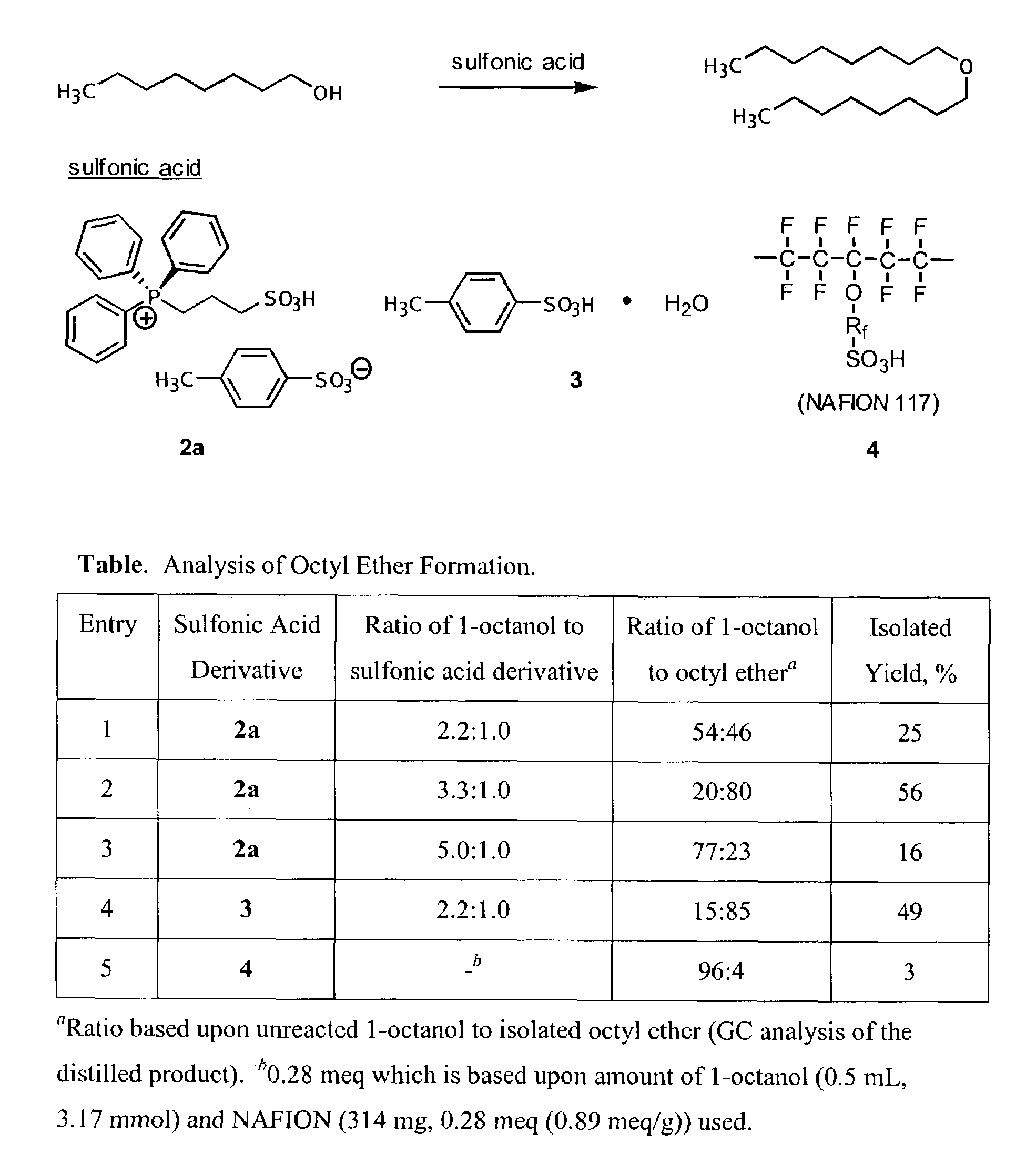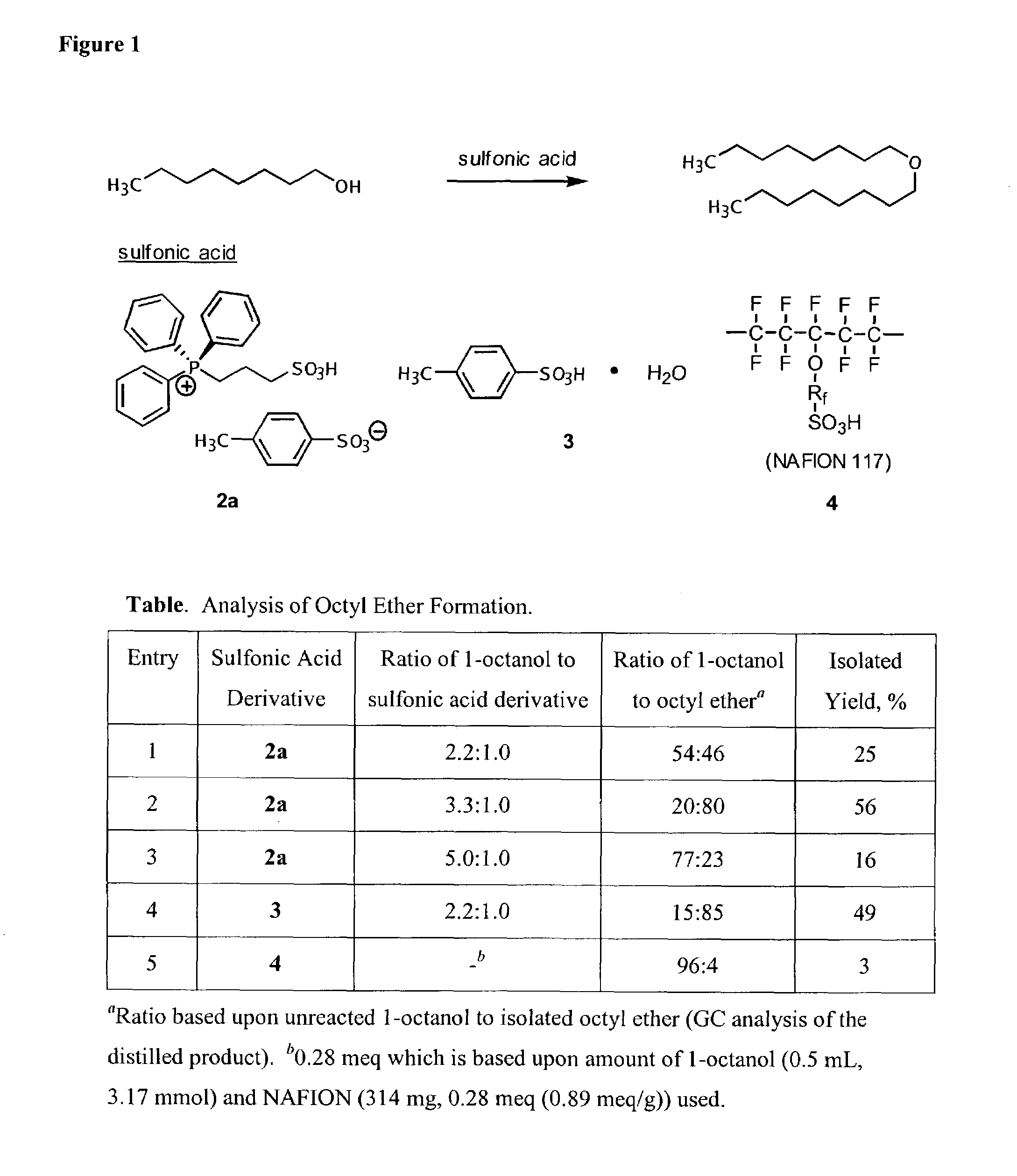Functionalized ionic liquids, and methods of use thereof
a technology of ionic liquids and functionalized ionics, applied in the field of functionalized ionic liquids, can solve the problems of high mw/active site ratio, rapid deactivation from coking, and restricted access to matrix-bound acidic sites
- Summary
- Abstract
- Description
- Claims
- Application Information
AI Technical Summary
Problems solved by technology
Method used
Image
Examples
example 1
Brønsted Acidic Ionic Liquids and their Use as Catalysts-Solvents
General Considerations
[0841]1H NMR (300 MHz) and 13C NMR (75 MHz) spectra were obtained as solutions in either CDCl3 or D2O. Chemical shifts were reported in parts per million (ppm, δ) and referenced to CHCl3 (δ 7.27) or D2O (δ 4.88). Infrared spectra were recorded as a thin film on sodium chloride and absorptions were reported in wavenumbers (cm−1). Melting points are uncorrected. Distillations were performed using a Kugelrohr ball-tube distillation apparatus. Gas chromatographic analyses were performed using an Agilent 6850 system (FID). TLC analyses were performed on Whatman flexible polyester backed TLC plates with a fluorescent indicator. Detection was conducted by UV absorption (254 nm) and charring with 10% KMnO4 in water. Baker silica gel (47–61 microns) was used for all chromatographic separations. Anhydrous organic solvents were dried and then distilled prior to use. Acetic acid, acetic anhydride, benzopinaco...
example 2
Reuse of a Brønsted Acid Ionic Liquid in the Formation of Ethyl Acetate
[0857]
[0858]The reaction setup used to illustrate the reuse of the IL in synthetic transformations consisted of a 5 mL reaction conical vial equipped with a magnetic spin vane. Attached to the conical vial was a Hinkman-Hinkle still head which itself was equipped with a Claisen adapter and reflux condenser. Proper alignment of one of the two inlet ports of the Claisen adapter was essential for the addition of reagents via a syringe pump. The setup was equipped with a drying tube packed with CaCl2 and heated externally via a sand bath.
Representative Procedure
[0859]To the 5 mL reaction conical vial charged with 2.1 g IL (4.0 mmol) was added via syringe acetic acid (1.0 mL, 17.5 mmol) and ethanol (1.0 mL, 17.5 mmol). The reaction mixture was allowed to warm to a maximum temperature of 175° C. (external temperature) over a period of 45 min. Although completion of reaction was observed prior to reaching the maximum te...
example 3
Synthesis and Characterization of Thioether IL 1 and Sulfoxide IL 1
[0863]
Part 1
[0864]A 250 mL round-bottomed flask was charged with a magnetic stirbar, 100 mL of toluene and 10.0 g (80.6 mmol) 1-butyl imidazole. To this solution was then added 10.4 g (80.6 mmol) of 2-(chloroethyl) ethyl sulfide. A condenser was fitted, and the solution heated to and maintained at reflux for 12 h. During this time, a dense yellow-brown liquid phase separated from the toluene. After cooling, the toluene layer was separated and discarded, and the lower, ionic liquid layer washed with 2×50 mL of diethyl ether. The viscous liquid was dried overnight in vacuo (15.2 g, 76%).
Part 2
[0865]The imidazolium chloride product from Part 1 (15.2 g, 61.1 mmol) was dissolved in 100 mL of acetonitrile and treated with 6.4 g (61.1 mmol of ammonium tetrafluoroborate, the suspension stirred overnight. The suspension was filtered and the solvent removed in vacuo to leave the tetrafluoroborate salt of the imidazolium cation...
PUM
| Property | Measurement | Unit |
|---|---|---|
| melting points | aaaaa | aaaaa |
| thermal decomposition point | aaaaa | aaaaa |
| temperature | aaaaa | aaaaa |
Abstract
Description
Claims
Application Information
 Login to View More
Login to View More - R&D
- Intellectual Property
- Life Sciences
- Materials
- Tech Scout
- Unparalleled Data Quality
- Higher Quality Content
- 60% Fewer Hallucinations
Browse by: Latest US Patents, China's latest patents, Technical Efficacy Thesaurus, Application Domain, Technology Topic, Popular Technical Reports.
© 2025 PatSnap. All rights reserved.Legal|Privacy policy|Modern Slavery Act Transparency Statement|Sitemap|About US| Contact US: help@patsnap.com



